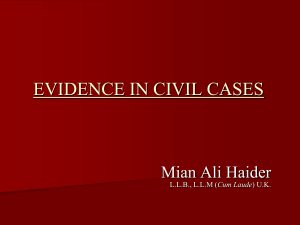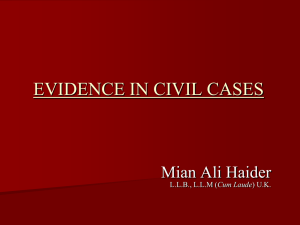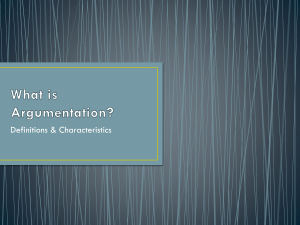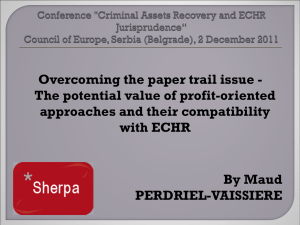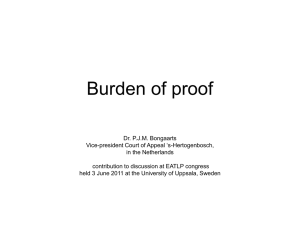Presumptions and burdens
advertisement
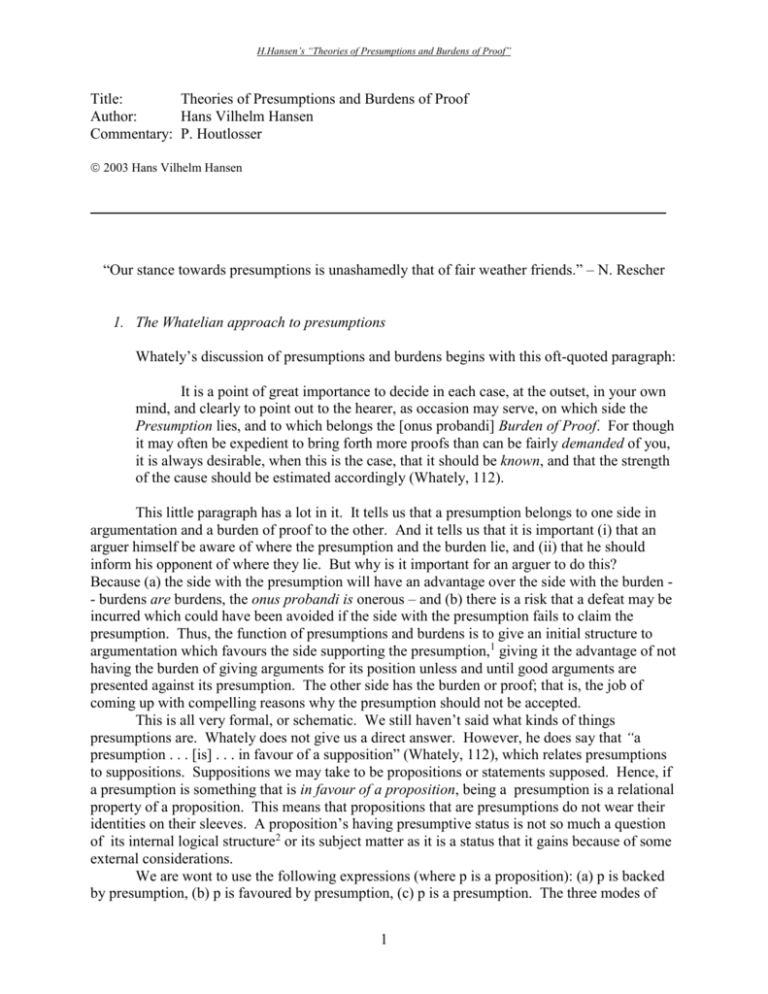
H.Hansen’s “Theories of Presumptions and Burdens of Proof” Title: Theories of Presumptions and Burdens of Proof Author: Hans Vilhelm Hansen Commentary: P. Houtlosser 2003 Hans Vilhelm Hansen “Our stance towards presumptions is unashamedly that of fair weather friends.” – N. Rescher 1. The Whatelian approach to presumptions Whately’s discussion of presumptions and burdens begins with this oft-quoted paragraph: It is a point of great importance to decide in each case, at the outset, in your own mind, and clearly to point out to the hearer, as occasion may serve, on which side the Presumption lies, and to which belongs the [onus probandi] Burden of Proof. For though it may often be expedient to bring forth more proofs than can be fairly demanded of you, it is always desirable, when this is the case, that it should be known, and that the strength of the cause should be estimated accordingly (Whately, 112). This little paragraph has a lot in it. It tells us that a presumption belongs to one side in argumentation and a burden of proof to the other. And it tells us that it is important (i) that an arguer himself be aware of where the presumption and the burden lie, and (ii) that he should inform his opponent of where they lie. But why is it important for an arguer to do this? Because (a) the side with the presumption will have an advantage over the side with the burden - burdens are burdens, the onus probandi is onerous – and (b) there is a risk that a defeat may be incurred which could have been avoided if the side with the presumption fails to claim the presumption. Thus, the function of presumptions and burdens is to give an initial structure to argumentation which favours the side supporting the presumption,1 giving it the advantage of not having the burden of giving arguments for its position unless and until good arguments are presented against its presumption. The other side has the burden or proof; that is, the job of coming up with compelling reasons why the presumption should not be accepted. This is all very formal, or schematic. We still haven’t said what kinds of things presumptions are. Whately does not give us a direct answer. However, he does say that “a presumption . . . [is] . . . in favour of a supposition” (Whately, 112), which relates presumptions to suppositions. Suppositions we may take to be propositions or statements supposed. Hence, if a presumption is something that is in favour of a proposition, being a presumption is a relational property of a proposition. This means that propositions that are presumptions do not wear their identities on their sleeves. A proposition’s having presumptive status is not so much a question of its internal logical structure2 or its subject matter as it is a status that it gains because of some external considerations. We are wont to use the following expressions (where p is a proposition): (a) p is backed by presumption, (b) p is favoured by presumption, (c) p is a presumption. The three modes of 1 H.Hansen’s “Theories of Presumptions and Burdens of Proof” expression are used interchangeably but (c) hides the fact that a presumption is a relational property of a proposition. That external, or relational, consideration is found in how presumptions are established, or by what means they are brought forward. Kauffeld, in his analysis of Whatelian presumptions, writes that “presumptions are a special kind of inference,” and that they are “the conclusions drawn in an inferential act of presuming” (Kauffeld 2002). The word “inference,” we recall, is ambiguous between the act of inferring and what is the immediate result of that act. Kauffeld is clear that he intends “inference” in the second sense: a presumptive proposition is a proposition inferred. His view that presumptions are a special kind of inference would be equal to the view that presumptions are a distinct class of propositions who owe their uniqueness to the fact that they have been inferred by a special kind of rule of inference.3 Stanley’s famous, “Dr. Livingstone, I presume,” thus entails, “Dr. Livingstone, I infer.” Let us, then, consider it to be the Whatelian view that presumptions are inferences, and that when it is an advantage to have the presumption this means that it is an advantage to be entitled to an inference licensed by some rule of presumptive inference. This brings us to the point where we must identify rules of presumptive inference. Whately doesn’t speak of “presumption-conferring rules,” but we may interpret him as holding that such there are. His (unsystematic) inventory of “a few of the cases in which it is important, though very easy, to point out where the presumption lies” (Whately, 114) can be adapted as a set of rules for presumptive inferences. There is a presumption, says Whately, (a) in favour of every man’s innocence until he is proven guilty (112-13); (b) in favour of ownership of that of which a person or corporation is in actual possession (113); (c) in favour of existing institutions (114); (d) in favour of the harmlessness of any given book (115); (e) in favour of the opinions of people who have authority (118); (f) against paradoxical claims (or in favour of received opinions) (115), and (g) against every change (124). This is not a complete list but it gives us something to work with.4 The items on the list may be classified. I think that (a), (b), and (d) are rules which, when applied, yield what we might call policy presumptions. They indicate an attitude that we should take toward a proposition; e.g., if Olsen has been accused of stealing money, then the proposition, “Olsen did not steal the money,” is to be presumed true according to (a), no matter how justified we may be on other grounds of thinking he is the culprit. Some of Whately’s other rules, (c), (e) and (f) are principles which yield what we may call epistemic presumptions. Fermat’s last theorem has been proven, for example, is a presumption inferred and licensed by rule (e).5 Finally, (g) is very general, and it underscores that Whately has a conservative view of presumptions. It may be thought that (g) is the fundamental principle from which the others are derived, and that if it cannot be supported, neither can be the others. Perhaps this is so. Conservatism serves both social policy and epistemology,6 albeit in different ways. The former since a change need not be a change for the better, the latter since what has served us well so far should be rejected only with good reason. Still, we should not over do it in our attempt to construct Whately’s theory as a well-ordered one. Rule (g) may well be some kind of a catchall rule to cover the kinds of cases that Whately has no 2 H.Hansen’s “Theories of Presumptions and Burdens of Proof” time or patience to review. In that case, if we find (g) disagreeable it is no reason to dismiss the others. Taking this a step further, even if we find all of Whately’s proclaimed rules objectionable and we want to dismiss them all, this is not a reason to reject the Whatelian view that presumptive propositions are inferred from presumptive rules. Perhaps some other set of rules might serve us better. But let us continue our examination of presumptive inferences. We can make the reasoning more perspicuous like this. Major Premise: Everyone accused of a crime is to be presumed innocent (until proven guilty) [Presumption rule] Minor Premise: Olsen has been accused of a crime [Antecedent fact] Conclusion: There is a presumption that Olsen is innocent [Presumptive proposition] Here is a simple case of universal instantiation combined with modus ponens, and it appears that all cases of presumptive propositions may be established in a similar way. The distinction to be highlighted is the one between Presumption Rules and Presumptive Propositions. When we speak of a presumption that p, we are not always clear whether we mean a rule or a proposition. Whately appears to be speaking of what I am calling presumptive rules when he gives his generalizations about where the presumption lies;7 when Ilbert and Kauffeld declare that presumptions are inferences, they appear to be speaking of what I am calling presumptive propositions. By my distinction the rules themselves are not presumptions, but the propositions inferred from them are. The application of the rules is what confers presumptive status on some propositions. It is important to emphasize that Olsen is innocent is not the conclusion of the above syllogism, and this is brought out by considering more carefully the logical form of presumptive propositions. Where ‘p’ is a (non-presumptive) proposition, let “Γp” mean “p is a presumption. Then the logical form of the Presumptive Rule, Anyone accused of a crime is to be presumed innocent, may be given as (x)[(Px & Ax) Γ(Ix)] [Presumption rule] Let us add, then, that Olsen is a person who has been accused of a crime,8 Po & Ao [Antecedent fact] and from this we may infer the conclusion Γ(Io) [Presumptive proposition] Seeing the argument laid out this way allows us to recognize five distinct lines of criticism which could be made against it. One can object to the presumption rule, or the minor premise, or the premise-conclusion link, or the conclusion (which would imply an objection to one of the first three possibilities), or one can accept the conclusion but deny the nested proposition. On the Whatelian theory it is the combined accepting that Γp and rejecting that p which activates the obligation to defend not-p. “Io” is the proposition that Olsen is innocent – it is “nested” in “Γ(Io)” – and “Γ(Io)” is the proposition that Olsen is to be presumed innocent. “Γ(Io)” and “Io” are logically independent of one another – “Γp” is the form of a non-truth-functionally compound proposition – and hence Olsen’s innocence cannot be inferred from the presumption that he is innocent. 2. Sidgwick’s rejection of the Whatelian presumptions 3 H.Hansen’s “Theories of Presumptions and Burdens of Proof” Sidgwick’s criticisms of Whately’s theory of presumptions may be seen as consisting of three parts: (1) On the question of function, Sidgwick may be seen as arguing that the theory, as Whately put it forward, could not fulfill its promise, and (2) even if it could, it incorporated a model of argumentation which did not serve the end of free inquiry. Finally, (3) on the question of how presumptions are identified in argumentation, Sidgwick argued that, outside the law, argumentation lacked the very stuff that makes the use of presumptions feasible within legal reasoning. (1) Whately had argued that because there is a presumption in favour of existing institutions, and because Christianity was an existing institution, there would be a burden of proof on those who deny that Christianity had a divine origin. Sidgwick criticized this argument on the basis that the mere existence of the institution of Christianity did not create a presumption of truth for its basic tenets and thereby allocate a burden on non-Christians to disprove Christianity’s alleged origins. We should notice what Sidgwick fails to admit, viz., that this is a criticism not of Whately’s theory of presumptions but of a particular presumption-conferring rule.9 Sidgwick, however, did have a criticism to direct against the theory, although it was not well-developed. “Various forms of paganism exist,” he wrote, “are we therefore to believe without inquiry whatever their followers may choose to assert about them?” (Sidgwick, 155) Here Sidgwick supposed that Whately’s argument -- that there is a presumption for Christianity’s divine origin because Christianity exists as an institution – would license the analogical inference that other religious institutions would enjoy a similar benefit, namely that there will be a presumption in support of each of their dogmatic pronouncements. His point raises two distinct questions, the one historical, the other logical. The historical point concerns the question whether, in Whately’s view, there could be “inconsistent” religious presumptions when different religious institutions face each other? Apparently so, for Whately wrote: ... in any one question the Presumption will often be found to lie on different sides, in respect of different parties. E.G. In a question between a member of the Church of England, and a Presbyterian, or a member of any other Church, on which side does the Presumption lie? Evidently, to each, in favour of the religious community to which he at present belongs (ER 118). If Whately acknowledges that Anglicans and Presbyterians may enjoy different presumptions, then why not Christians and Jews, Jews and Muslims, or pagans and Christians? This seems to be a reasonable extension of Whately’s view, and we may presume that Sidgwick’s complaint would not have surprised Whately. But the logical point raised by Sidgwick -- that the theory of presumptions gives us equal reason to believe the pronouncements of Christians as well as pagans (Sidgwick, 155) -- is quite different. However, it does not amount to a refutation of the status or utility of presumptions. If p and q are contraries or contradictory they cannot both be true,10 but it is not the case that if p and q are contraries that there cannot be a presumption for p and a presumption for q. What is not possible, we should argue, is that a proposition, p, inferred via a certain presumptive rule, and not-p, inferred by the same rule, should both have presumptive status within the same epistemic community at the same time. But nothing in Whately’s theory forces us to think that they could, and so Sidgwick’s intimation of a fatal inconsistency does not materialize. However, the point that Sidgwick could 4 H.Hansen’s “Theories of Presumptions and Burdens of Proof” have made here is that if there is no reason to prefer the presumption of one side to the presumption of the other side, then the function of presumptions -- to give one side an advantage over the other in argumentation -- cannot be realized. This result shows a limitation in the utility of presumptions. (2) The use of presumptions within the law was recognized by Sidgwick as reasonable. “The value of this procedure,” of using presumptions, he writes, “as a short cut, or as a weapon against mere obstruction, must be apparent at once” (Sidgwick, 159). Presumptions may function as a short cut; for example, “a person found in possession of stolen goods soon after the theft, is presumed to be a thief” (Sidgwick, 159).11 Being sometimes allowed this kind of inference saves the prosecution time and trouble. Another advantage to a system of presumptions is that they can prevent someone’s efforts to frustrate a court’s progress by continuously raising questions whose answers are well known but perhaps difficult to prove; in such a case, the court puts the burden on the ones who dissent from received opinions. However, reasoning within the law is one thing, and outside it another. Convenient . . . as such a plan may be where there is an authority competent to frame the rules, it is obvious that outside certain artificial institutions, existing for some special purposes, no such authority exists. . . . If, as Whately claimed, those who put forward assertions in harmony with ‘prevailing opinion’ were to be altogether exempt from giving a reason for the faith that is in them, or if those who bring forward facts in opposition to prevailing opinion were to be thereby ruled out of court at once, with whom would rest the right of deciding what assertions and facts really come within such privilege? Even an Archbishop, it must be acknowledged, might fail to catch the precise moment when a struggling truth really begins to ‘prevail’ . . . (Sidgwick, 159-60). Here we will find it useful to avail ourselves of Reachers distinction between conventional and natural dialectics. In the former kind of argumentation (e.g., disputation, debate and law) the presumption-conferring rules will be conventional rules; in the latter kind of argumentation, the presumption-conferring rules (if any there are) will be non-conventional, or natural (Rescher, 43). Adopting this distinction, Sidgwick appears to think that presumptions have a role to play in conventional dialectics that they do not have in natural dialectics. According to Sidgwick, in natural dialectics there are no fixed rules for determining what propositions are presumptive and there is no authority (like a judge) for determining when a proposition acquires presumptive status. Sidgwick mocked Whately’s theory of presumptions when he said, “Even an Archbishop . . . might fail to catch the precise moment when a struggling truth really begins to ‘prevail’,” implying that even Whately would not be able to say when a particular proposition gains or loses presumptive status. The reference above to “artificial institutions” and to “artificial law” (Sidgwick, 163) are meant to contrast with “natural law” (Sidgwick, 163). “In practice, legal argumentation is ‘artificial’, . . . simply because the law itself sets constraints on what is to count as an acceptable legal argument,” explains Bickenbach, and “The most obvious example of this kind is the criminal trial where the presumption of innocence creates a wide-ranging dialogic asymmetry which favours the accused . . .” (Bickenbach, 23). Within law, then, presumptions may be assigned because they are “defined to some extent by set rules” (Sidgwick, 159); these rules are in part constitutive of the law, and they decree when presumptive status is to be given to a proposition. In addition, there are skilled people (judges) who have the authority to say when a 5 H.Hansen’s “Theories of Presumptions and Burdens of Proof” proposition has presumptive status, and when it does not. Things are very different in natural dialectic, we can hear Sidgwick saying. Not only is there no set of artificial rules that objectively say when a proposition is a presumption, there is no person with the authority – not even an Archbishop – to decide the hard cases. Sidgwick thinks that the law governing the burden of proof, is a “natural law, ” (Sidgwick, 163) but he does not think that there is any natural law, corresponding to the artificial law of jurisprudence, to determine when a proposition is a presumption. This argument is in effect a denial of the possibility of a set of presumption rules such as those we attributed to Whately. We should notice that Sidgwick makes his case look simpler than it really is. Does he have an argument that there are no natural presumption-conferring rules? Not really. However, Sidgwick is right in pointing out that in natural dialectics there is no institutionalized judge to dictate to us which propositions are presumptions, and when. But again, that is not to say, that a rational inquirer would not be able to treat a proposition justifiably as a presumption. (3) Sidgwick’s view that there are no objective rules for establishing presumptions in natural dialectics, lead him to another criticism of the use, or function, that presumptions have, namely, that the theory of presumptions may be put in the service of prejudice and irrationality. [I]f we suppose that whenever a bold assertor takes refuge behind his two-thirds majority, the spirit of free inquiry ought at once to apologise tamely for having dared to put awkward questions or to bring forward awkward facts, we have only ourselves to blame for the loss we suffer (Sidgwick, 161). This passage shows that there is a fundamental disagreement between Whately and Sidgwick about how argumentation should proceed. Whately thinks it should begin by identifying the presumptions in play, and go from there: the side with the burden will make arguments which may or may not warrant a response from the side holding the presumption. Sidgwick thinks that this procedure does not serve the pursuit of truth, but stifles it. He would have it that whoever asserts a proposition, whether it is a received opinion or a novel hypothesis, should defend his position if asked to do so. Still, Sidgwick admits that sometimes shortcuts are practicable; that is, it may serve our purposes sometimes to avail ourselves of the rules used for establishing presumptions. Rough and ready rules for interpreting facts have a value certainly, even outside a Court of Justice. But there is all the difference between using these as our servants, and allowing them to become our masters (Sidgwick, 160-61). The implication is that on Whately’s theory presumptions are our masters. Even though they are indexed to epistemic communities at a time, they are fixed independently of the purpose and the requirements of the argumentation. For Sidgwick, the purpose and requirements of the argumentation come first, and then, if practicable, some propositions may be treated as if they are presumptions, So long as they are employed confessedly as a mere apparatus for saving time at the cost of some exactness, no harm is done: for where the thesis is more than unusually important we can take more than the usual care (Sidgwick, 161). 6 H.Hansen’s “Theories of Presumptions and Burdens of Proof” For Sidgwick, then, whether a proposition should be treated as a presumption will depend on the degree of certainty sought in the argumentation: in one argumentation the proposition may have presumptive status, in another not. On this contrast Whately’s theory is a rigid and absolute theory of presumptions and Sidgwick’s theory – in so far as he has a theory of presumptions – is a flexible and pragmatic one. 3. Rescher’s defence of presumptions As with Sidgwick, the importance of the burden of proof is not lost on Rescher. He writes, It cannot be emphasized too strongly that the idea of burden of proof is not a strictly logical concept. ... Rather than being a logical concept, burden of proof is a methodological one. It has to do not with valid or invalid reasoning, but with probative argumentation in dialectical situations. The working of the conception of burden of proof represents a procedural or regulative principle of rationality in the conduct of argumentation, a ground rule, as it were, of the process of rational controversy– a fundamental condition of the whole enterprise (Rescher, 29-30). Moreover, Rescher agrees with Sidwick that the burden of proof rule is not a logical rule; however, whereas Sidgwick gives it no more than a rhetorical or psychological standing – a hypothetical imperative to the effect that one must sometimes provide a proof if one wishes to convince a doubter – Rescher gives the standing of a methodological principle to the burden of proof rule. By this he means that the structure of dialectical disputation is (partly) determined by this rule. In practice it implies that argumentation is to be conducted in a way that gives central importance to the assignment and possible discharging of burdens of proof. On the question of presumptions, however, Rescher is with Whately and not with Sidgwick. But whereas Whately saw the function of presumptions as giving an advantage to those who argue -- an advantage we may describe as disputational rather than rational -- Rescher writes that “In rational controversy, there must always be some impartially fixed common ground determining what is to count as evidence,” (Rescher, 30) and this common ground will be that of presumptions. Hence, Rescher’s view is that presumptions are just as constitutive a part of dialectics as are burdens of proof for, without presumptions, thinks Rescher, it would not be possible to build a case to meet a burden of proof, and then the function of burden of proof would be idle (Rescher, 33). Clearly, if the burden of proof inclined against every contention – if there were an automatic presumption of falsity against any contention whatsoever – it would become in principle impossible ever to provide a persuasive case. The rule that each contention needs evidential support through the adducing of further substantiating contentions cannot reasonably be made operative ad infinitum (Rescher, 33). Rescher sees that there are a number of different practices which establish presumptions in different ways: that is – from my perspective – there are different argumentation practices which recognize distinct sets of presumption-conferring rules. These practices include law, disputation, debate and epistemology. The first three are instances of conventional dialectics 7 H.Hansen’s “Theories of Presumptions and Burdens of Proof” with artificial rules for presumptions, but the latter – questions in the theory of knowledge – are the locus of rational dialectics. In rational dialectic, unfetterd by conventions, “one must rely on the natural presumptions fixed by purely probative consideration of evidential and intrinsic plausibility” (Rescher, 38). And here the rule is Presumption favours the most plausible of rival alternatives– when indeed there is one. This alternative will always stand until set aside (by the entry of another, yet more plausible presumption) (Rescher 38). This rule is general, it is in the service of rational dialectic, it is epistemic in character, and is natural rather than conventional. “The plausibility of a thesis ... reflects the prospects of its being fitted into our cognitive scheme of things in view of the standing of the sources or principles that vouch for its inclusion herein” (Rescher, 38). In rational dialectics of this kind, the natural rule of inference which yields presumptive propositions is one that presupposes the concept of a plausible proposition. The alternative route to presumptions must be within a conventional framework (Rescher, 38). 4. Is Pragma-dialectics really presumption free? Pragma-dialectics agrees with Rescher on the point that the burden of proof rule has methodological rather than logical status. However, respectively, they view the rule as contributing to two different methodologies: Rescher sees the burden of proof rule as having a role in various different dialectical practices, some with ideological purposes (the law), for example, others with epistemological purposes (rational dialectics); Pragma-dialecticians knowingly divorce themselves from these narrow or specific functions of the burden of proof rule and give it a purely methodological role; in their theory the burden of proof has no truck with, ethical, aesthetic, epsitemological or juridicial considerations (Van Eemeren & Houtlosser 2002, 20). The Pragma-dialectical theory has no room at all for the role of presumptions, either the rhetorical role suggested by Whately, the epistemological one identified by Rescher, or the pragmatic role allowed by Sidgwick. It shies away from the Whatelian ideas of presumptions because it is unhelpful for a problem which Pragma-dialectics considers of great importance, namely how to proceed in a ‘mixed dispute’ (by which they mean a piece of dialectical argumentation in which the participants are urging logically inconsistent views and thereby both acquiring a burden of proof). In such situations, who, it is asked, should argue first? Whately does not have an answer, but Pragma-dialectics thinks there should be one. Interestingly, the Pragma-dialectical position repeats a complaint familiar from Sidgwick. Taking the example of one of the presumption-conferring rules – Whately’s status quo rule12 – van Eemeren and Houtlosser write, “in actual practice people often tend to disagree as to what is to be considered the ‘status quo’” (Van Eemeren and Houtlosser, 19). In a footnote accompanying this observation Gaskins’ remark about the changing presumption with regard to public institutions is quoted, and Goodnight’s plea for a liberal (rather than Whately’s conservative) presumption is mentioned (Van Eemeren and Houtlosser, 19 n. 14). I am sure that there is no secundum quid intended in this argumentation; however, showing that one of Whately’s casually suggested presumption-conferring rules no longer holds, is not surprising 8 H.Hansen’s “Theories of Presumptions and Burdens of Proof” (even to Whately!) and it is insufficient to reject the role of presumptions in argumentation. Insufficient, that is, unless a better way can be found. Rescher argued that the burden of proof rule would have no bite in rational dialectics unless presumptions were allowed. The reason was this: if there are not some propositions which do not need to be proven, then it will be impossible to ever build an argument to meet a burden of proof; presumptions being a set of propositions which do need to be proven then, without them, the burden of proof rule would serve no purpose. This form of rational dialectics is rejected by Pragma-dialectics, but the general problem is accepted. Therefore, the problem for Pragma-dialectics is to find another way of identifying a class of propositions from which one could build an argument to meet a burden of proof. How is it possible for Pragma-dialectics to lean heavily on the burden of proof rule and ignore the role of presumptions? It manages to do so by excusing some assertions from the burden of proof, namely those initial material commitments (premises) and formal commitments (the rules of a Critical Discussion) which are jointly asserted, or agreed upon, by the participants in argument (Van Eemeren and Houtlosser, 20). These material commitments, because the are agreed upon by the participants in the opening stage of the argumentation, become the burdenof-proof-free starting points of the argumentation for both participants in a dispute, and the burden of proof rule will apply only to any new assertions made subsequent to, and over and above, the initial commitments. That this position differs from Rescher’s is attested to in a footnote which says that Pragma-dialectics agrees with Rescher on the need for common ground but rejects presumptions as being a suitable source (p. 22, n. 19). The common ground identified for Pragma-dialectical argumentation is the agreed upon starting points. However, the Pragma-dialectical solution to the problem created by the rejection of presumptions is to afford to the agreed upon starting points of the two arguers a status similar to that of presumptions. Similar in that they are free from the burden of proof and dissimilar in that they do not seem to resemble presumptions as we have become used to thinking of them, i.e., propositions inferred from presumption-conferring rules. But let us consider this point in a different light. Is Pragma-dialectics a conventional or a natural system of argumentation? This question is not very clear. Instead, let us ask then, ‘Are the rules of Pragma-dialectics conventional rules or natural rules?’ The rules are claimed to be both problem-solving and inter-subjectively (conventionally) valid; that they are problem-solving valid is an indication that they are natural rules because their problem-solving validity is tested against the fallacies and some of the fallacies, at least, are natural blunders. However, not all the rules of Pragma-dialectics can reasonably be seen to be natural rules; some of them, like rules 1 and 9 seem to be conventional through-and-through. Pragma-dialectics, then, is not a purely natural system, it is at least partly conventional. If Pragma-dialectics is partly conventional then it can have conventional rules for conferring presumptions (even if the theory doesn’t recognize the rules as presumption conferring). The rule that the starting points are to be determined by joint agreement of the protagonist and the antagonist, may be turned into a presumption conferring rule like this: For the purpose of Critical Discussion, C, the set of propositions (or commitments), S, agreed upon by the protagonist and antagonist of C at the opening stage of C, will be presumptions for the duration of C. [Pragma-dialectical presumption rule] 9 H.Hansen’s “Theories of Presumptions and Burdens of Proof” This unusual rule is conventional, as is the “presumed innocent” rule of some legal systems. These conventional presumptions in Pragma-dialectics will have the same function that natural presumptions have in rational dialectics: they will be the basis for meeting the burden of proof for other assertions made, and, I am suggesting, these “presumptions” could be established by a particular (conventional) rule, which is another mark of presumptions. There is just one more point to touch upon. During the course of a critical discussion, the participants will be called upon to make deductive arguments in support of their standpoints. What reason can there be for banning arguments like the one we laid bare in our discussion of Whately? Major Premise: Minor Premise: Conclusion: Everyone accused of a crime is to be presumed innocent (until proven guilty) [Presumption rule] Olsen has been accused of a crime [Antecedent fact] There is a presumption that Olsen is innocent [Presumptive proposition] Surely, it is not the intention of Pragma-dialectics to outlaw argument of this kind. The answer I anticipate is that although it is an argument which introduces a presumption into the argumentation, there is a world of difference in how that presumption is introduced. If the participants to the critical discussion have agreed to allow the use of presumption rules, then the argument is allowed; if they have decided against the use of presumption rules, then a dialogue participant is free to reject the argument. Moreover, whereas in the Whatelian position the burden of proof lies with those who would deny a presumptive proposition, in Pragma-dialectics the burden of proof lies with those who dare to express their views. Perhaps that is a harsh way to put it, but I think it follows from the claim that “the burden of proof is on the side of those whose standpoints are challenged by the other party” (Van Eemeren and Houtlosser, 18).13 Any standpoint – any assertion – other than those turned into commitments at the opening stage, can be challenged. In other words, Pragma-dialectics does not appear to need an immediate connection between presumptive propositions and those propositions whose defenders are saddled with an onus probandi. References Bickenbach, Jerome E. (1990) ‘The “Artificial Reason” of the law,’ Informal Logic 12: 23-32. Eemeren, Frans H. van, and Peter Houtlosser (2002) “Strategic maneuvering with the burden of proof,” in Advances in Pragma-Dialectics, F. H. van Eemeren, Ed. Amsterdam: Sic Sat. pp. 13-28. Ilbert, Courtney Peregrine (1910) “Evidence” in Encyclopaedia Britannica, 11th ed. Kauffeld, Fred J. (1998) “Presumptions and the distribution of argumentative burdens in acts of proposing and accusing,” Argumentation 12: 245-66. 10 H.Hansen’s “Theories of Presumptions and Burdens of Proof” _____, (2002) “The ordinary practice of presuming and presumption with special attention to veracity and the burden of proof,” ISSA, Amsterdam. Quine, W. V., and J. S. Ullian (1978) The Web of Belief, 2nd ed. New York: Random House. Rescher, Nicholas (1977) Dialectics. Albany: SUNY. Sidgwick, Alfred (1884) Fallacies. Whately, Richard (1846) Elements of Rhetoric, 7rh ed. Notes 1 Whately sees that sometimes it is not an advantage to have the presumption (Whately, 129). 2 It seems they share the general logical structure of being contingent propositions. A famous passage from Ilbert proposes a similar view: “A presumption in the ordinary sense is an inference. ... The subject of presumptions, so far as they are mere inferences or arguments, belongs, not to the law of evidence, or to law at all, but to rules of reasoning” (Ilbert 1910: 15). 3 Viewed from the vantage point of Rescher’s later discussion, (a) and (b) may be seen as presumptions typical of the law, (e) and (f) as typical of disputation and debate, and (g) as typical of debate (Rescher, 36-37). 4 Mathematicians say it has been proved. See A. D. Aczel, Fermat’s Last Theorem. New York 1996. 5 “... conservatism only in a literal sense -- conservation of past beliefs” (Quine and Ullian 1978: 69). 6 “There is a presumption in favour of every existing institution.” ... ‘There is a “Presumption” against anything paradoxical” (Whately 114, 115). 7 8 Px = x is a person; Ax = x is accused of a crime; and Ix = x is innocent. 9 Identified as Whatelian rule (c) above. 10 Unless the existential assumption is abandoned. 11 Here is an example of where a policy presumption and an epistemic presumption appear to be at cross purposes. The policy presumption directs us to treat the accused as innocent, the epistemic presumption directs us to presume the possessor of the goods to be guilty. 11 H.Hansen’s “Theories of Presumptions and Burdens of Proof” 12 Rule (g) above. 13 The obligation is not created by the challenge, but the challenger requests the discharging of the protagonist’s obligation, an obligation he has (before the challenge) in virtue of his right to participate in the Critical Discussion. 12
